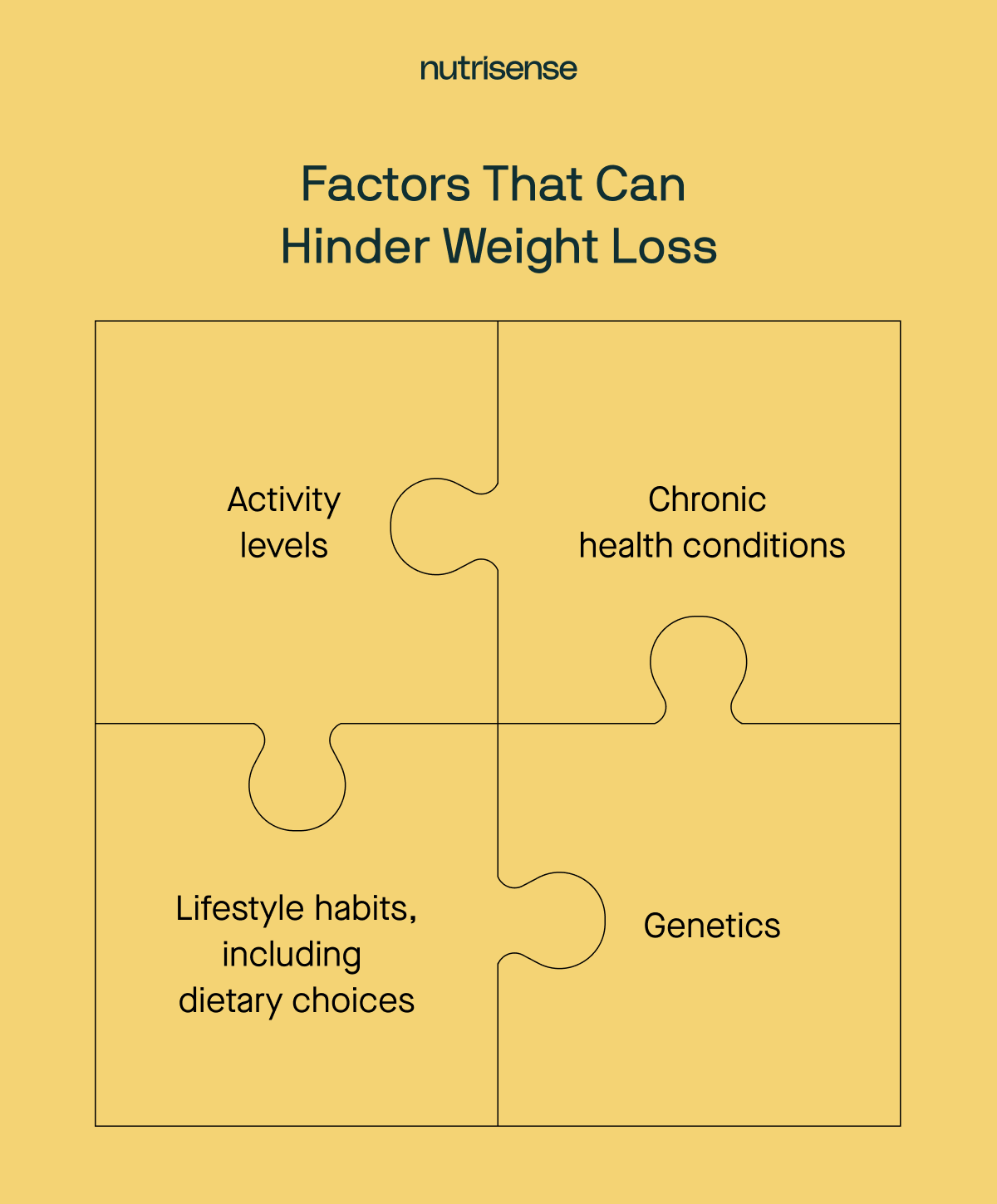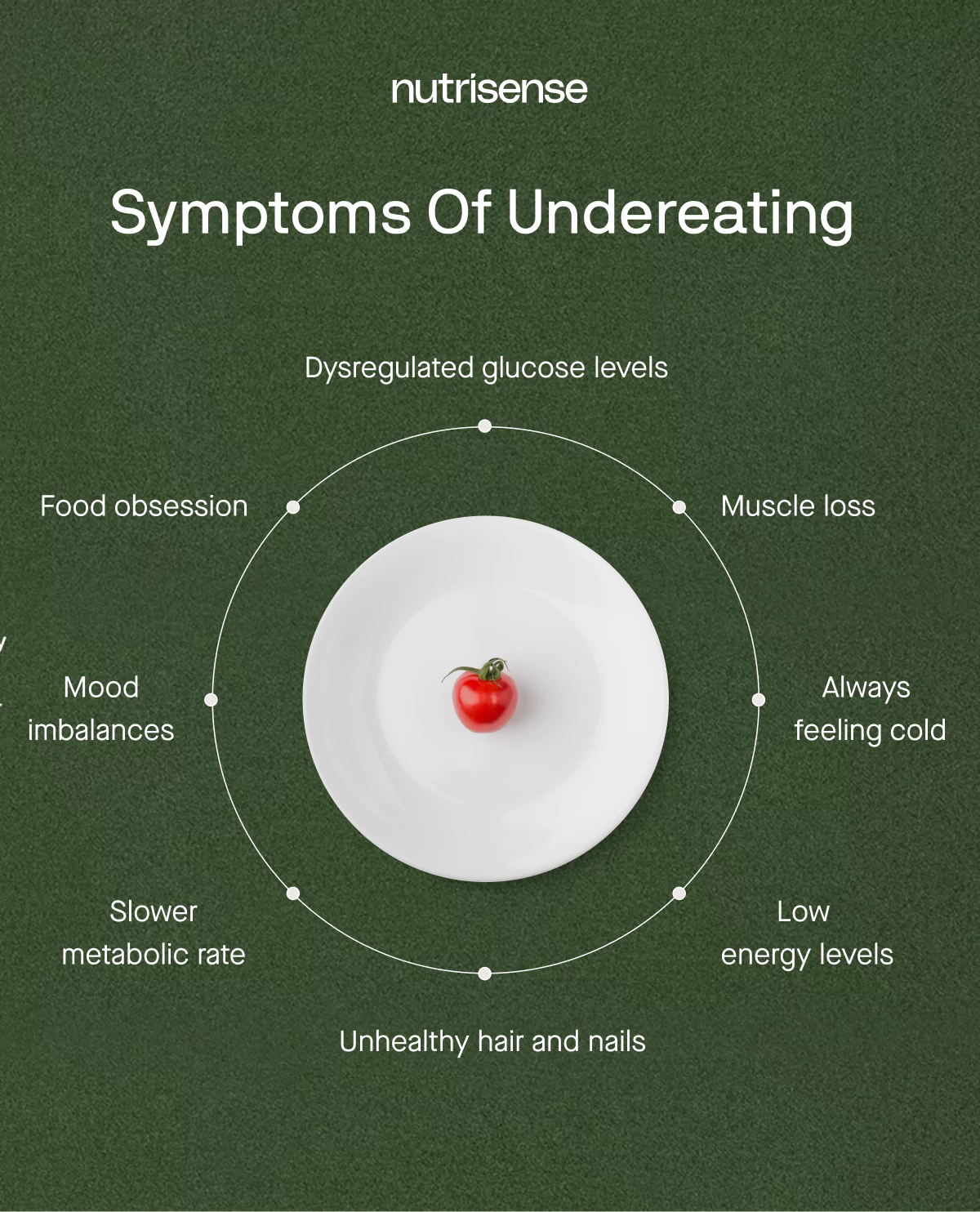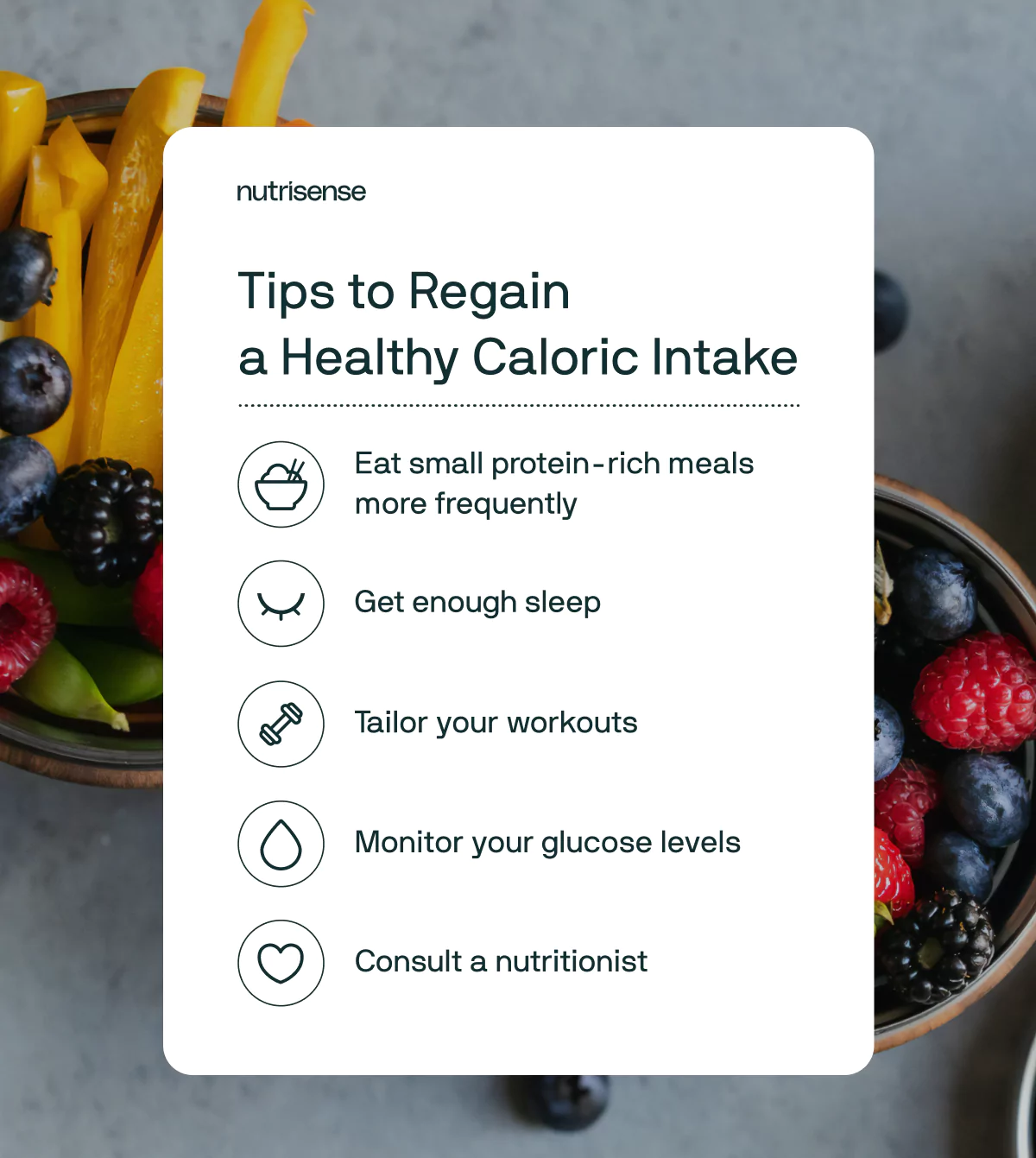
You’ve been eating less. Skipping snacks. Cutting meals. Watching every portion. And yet, the scale won’t budge, or you’re stuck in a plateau. Maybe it’s even creeping up! If that sounds familiar, you should consider that you may be watching your calorie intake and portion sizes a little too closely. As strange as it may sound, the problem might not be how much you’re eating, but how little.
Undereating is one of the most overlooked reasons weight loss stalls. When your body doesn’t get enough fuel (and you’re cutting healthy foods out of your diet), it can slow your metabolism, spike cravings, mess with your blood sugar or glucose levels, and send stress levels soaring. All of this will make it harder, not easier, to lose weight.
And it’s not just that your weight loss stalls. You can also find that you’re not only not losing body fat, but you may actually be seeing some weight gain. Shocking, right? You may also notice a loss of lean muscle mass.
In this article, we’ll break down:
- What “undereating” really means (and how to tell if it’s happening to you).
- Why being in a calorie deficit doesn’t always lead to weight loss.
- The signs your metabolism might be slowing down.
- How to safely increase your caloric intake, stabilize your glucose, and build energy back up.
- How a registered dietitian and glucose monitoring can help you get your weight loss goals back on track.
What is Undereating, and Why Is It So Common?

To explain it very simply: undereating means you’re consuming insufficient calories or nutrients to meet your body's basic energy and nutritional needs. People undereat for various reasons, and the motivations can be complex and multifaceted, including factors such as:
- Intentional caloric restriction for weight loss.
- A lack of access to an adequate food supply.
- Underlying body image concerns or eating disorders.
- Stress and emotional factors.
- Cultural or social influences.
Long-term undereating or extended calorie deficits, especially paired with overexercising, can lead to:
- Nutritional deficiencies
- Fatigue
- Weakness
and other health complications. This can also be the reason some people can't shed the pounds, no matter how hard they try. Of course, when it comes to weight loss, a certain level of calorie restriction can be helpful. However, a temporary moderate calorie deficit is not the same as undereating. When you consistently undereat, you’re not consuming enough calories or nutrients to sustain your daily metabolic functions, like breathing, digestion, and temperature regulation.
As registered dietitian and glucose-certified expert, Amanda Donahue, MS, RD, CD, explains,
"Striking a balance between calorie intake and energy expenditure is crucial to maintain overall wellbeing and support essential bodily functions. Whatever your diet, weight loss, and fitness goals look like, it’s essential to ensure your body gets all the nutrients it needs to function optimally."
If you aren’t sure how to do this in a safe, healthy manner, consider working with a registered dietitian or nutritionist for support.
Can You Gain Weight From Not Eating Enough?
If you’re on a weight loss journey and have been eating in a calorie deficit for several weeks or months without seeing any progress, you may find yourself asking, “why am I not losing weight even though I’m not overeating?”
After all, if you’re in a calorie deficit, shouldn’t it help you to lose weight? The answer is yes, and no. While a caloric deficit is typically promoted to support weight loss, reducing calories may not help everyone lose weight. There are many other factors that can affect someone's ability to lose weight, such as:

- Activity levels
- Chronic health conditions
- Genetics
- Lifestyle habits, including dietary choices
So why might you be gaining weight in a calorie deficit? When you undereat for too long, your body may respond by slowing your metabolism, making it harder to burn calories and easier to gain weight, even on fewer calories.
Research from the Pennington Biomedical Research Center from researchers Jasper Most and Leanne Maree Redman confirms this: long-term calorie restriction can lower your resting metabolic rate and make weight loss harder over time.
Working with a qualified registered dietitian, nutritionist or healthcare professional to raise your caloric intake, nourish your body adequately, and add appropriate levels of exercise into your lifestyle can help combat these effects. Monitoring how certain foods affect your glucose levels with a CGM or glucose biosensor can also help before making any changes to your diet.
What Are The Symptoms of Undereating?

Here are eight potential symptoms and side effects of undereating.
1. Energy Loss and Chronic Fatigue
Do you feel tired no matter how much you sleep? One of the earliest signs you’re not eating enough is having less energy. Nutrient deficiencies may contribute to fatigue in a variety of ways.
If you undereat for a prolonged period, this lower energy can lead to other health issues, including chronic fatigue, where even normal, daily activities tire you out. If you experience regular or significant energy dips, consider working with a trained dietitian to figure out what may be causing it!
2. Dysregulated or Imbalanced Glucose Levels
Although rare in individuals without diabetes, undereating could also cause hypoglycemia or low blood sugar. If you experience dizziness, sweating, or sugar cravings, you may want to consider a blood test to check your glucose levels. Wearing a CGM or glucose biosensor can also help you determine if your glucose levels are in abnormal ranges throughout the day.
3. Unhealthy Hair and Nails
Undereating sometimes leads to malnutrition, which can begin to show through physical signs. Your hair and nails rely on protein, healthy fats, and a number of micronutrients to grow strong and healthy. Without enough of those things, your hair may start to lose its shine, and your nails may become brittle or discolored or structurally distorted. As malnutrition intensifies, you may even experience hair loss.
4. Irritability and Mood Swings or Imbalances

Serotonin, dopamine, and norepinephrine are neurotransmitters that help regulate mood and cognition. All of these are made in the body from precursor amino acids and require nutrient building blocks for enzyme function. If you’re not consuming enough nutrients, it may affect this neurotransmitter production and regulation.
When your glucose levels are too low, which can occur from factors such as undereating, it can also make it difficult for your body’s stress-response regulation. This can cause a cycle of mood swings and irritability. More simply put? Undereating can quite literally make you “hangry!”
5. A Slower Metabolic Rate
Eating too few calories can cause your metabolic rate to slow down, meaning you may gain weight more easily. Your body requires energy when you walk, work out, think, breathe, just about everything else!
When you deprive your body of the fuel it needs, it will begin to store food and enter a sort of “survival mode.” So even when you exercise, your body will protect the fat that it has stored, and you may not be able to lose the weight you want to lose.
6. Food Obsessions and Cravings
During WWII, the University of Minnesota conducted a study showing that people experiencing a prolonged caloric deficit think about food constantly. Known as The Minnesota Starvation Experiment, the test found its subjects became obsessed with food over time.
There’s quite a simple explanation for this. When you constantly underfuel, your brain begins to fixate on food. This can turn into food obsession or even disordered eating patterns, which will make weight loss (and staying healthy) more difficult over time.
Remember: If you notice yourself thinking about food all the time, it’s a red flag, not a lack of willpower. Consult a healthcare professional and work 1:1 with a registered dietitian to craft a meal plan that helps you feel like you’re back in control.
7. Muscle Loss

Seeing the inches melt when you undereat? Don’t celebrate yet, because this is likely not healthy weight loss. When your body goes too long without the appropriate amount of calories it needs to function, it can stop recognizing the difference between fat and body tissue, and begin to burn lean body mass for fuel.
Muscle loss may also occur simply from lacking adequate nutrients, like protein and vitamin/mineral cofactors, for muscle protein synthesis (MPS). Sufficient protein and exercise can prevent this muscle deterioration and preserve lean body mass, so being in an extreme caloric deficit can also be detrimental for things like muscle growth.
8. Feeling Cold All the Time
Do you ever reach for a sweater while everyone else is still in a t-shirt? Do you feel unnaturally cold, even on a warm day? This could be due to a lack of nutrients in your diet, which may be because you’re not eating enough.
Thermogenesis is the dissipation of energy in the body, which occurs through heat production. When you don’t ingest enough calories, your body goes through starvation mode, or at the very least, isn’t producing enough energy. The next time you feel chilly and can’t explain why, make sure that you’re getting enough to eat so that your body can regulate its temperature.
6 Potential Causes of Unintentional Weight Gain
Discover the hidden factors contributing to unintentional weight gain. Uncover the causes behind unexpected pounds and take control of your health journey.
How to Regain a Healthy Caloric Intake if You’ve Been Undereating

If you’ve been stuck in a pattern of undereating, it can feel scary to eat more. But rebuilding trust with your body is key to real, sustainable progress. And it starts with nourishing yourself properly.
Some caloric deficits may help many people reach their target weight and achieve health goals. But as always, remember there’s no one-size-fits-all when it comes to staying healthy. And focusing on calories alone is unlikely to give you sustainable weight loss results.
The best way to regain a healthy caloric intake while still addressing your dietary and weight loss concerns is to get a nutrition coach (like a registered dietitian or qualified nutritionist) to help with your specific needs. In the meantime, here are some other tips to help you regulate your diet and boost your metabolic rate:
Get a Good Night of Sleep
Sleep is crucial to maintaining a healthy metabolism as well as healthy hormonal levels. As you reintroduce more calories into your diet, make sure you’re trying to get a regular sleep routine in place.
Simple things like keeping the room dark, minimizing technology use, and not eating too close to bedtime can help you sleep better. However, poor sleep is often influenced by what you are (or aren’t) eating, so your diet can have a big impact on your sleep. The good news, is that making the necessary healthier changes in your diet can help you naturally improve your sleep more over time, without any extra effort!
Track and Monitor Your Glucose Levels
How do you reintroduce a good amount of calories, protein, carbohydrates, and fats into your diet if you have weight loss goals? Consider a CGM or glucose biosensor program to help!.
CGMs track your glucose 24/7, so you’ll have insights from daily exercise, food, and habits, to see what your body responds best to. This puts you in the driver’s seat of your health and weight loss goals.
CGMs are not weight loss devices, so it’s not as simple as ‘balance glucose to lose weight.’ However, obesity and insulin resistance have close ties, so understanding your body’s glucose levels will help move the needle on your weight loss journey. To make sure you’re balancing weight management and glucose balance, consider working with a glucose-certified expert.
Get Advice From a Personal Dietitian or Nutritionist
Sometimes we all need a little extra help and encouragement to reach our health goals. 1:1 sessions with a registered dietitian can do just that: helping you to do a deeper nutrition assessment, understand your metabolic needs, and even help interpret glucose data if you’re using a CGM or biosensor. An expert you can trust, can help you meet your weight loss goals by creating sustainable healthy eating practices.
Eat Smaller Meals More Frequently
As your body readjusts to a healthy caloric intake, eating small meals throughout the day can keep your glucose stable. It can also help your body understand that you’re no longer in “survival mode" and make it feel more manageable to reintroduce extra calories if you’re worried about increasing your food intake. Prioritizing protein with these small meals is very important!
Introduce Gentle, Frequent Movement
If you’re struggling with chronic fatigue, hold off until you feel stronger. Pushing your body harder with exercise can be just as bad for your goals. Once you do, incorporate gentle movement to help your body grow stronger, improve lean muscle mass and body composition.
If you’re looking for a way to tailor your fitness approach to your unique needs, consider working with a sports dietitian who can help you understand how to properly fuel for best results.
Replace Undereating with Nutrition That Works for Your Body
If you’ve been stuck in a cycle of eating less and feeling worse, it’s time for a new approach. With Nutrisense, you’ll stop second-guessing every bite and start learning what actually fuels your body, using 24/7 glucose data and expert dietitian guidance.
You can work 1:1 with a registered dietitian (via insurance-covered video calls) who will help you rebuild your energy, stabilize your metabolism, and create habits that finally make sense for your life.
With Nutrisense, you can monitor your glucose with health tech like glucose biosensors and continuous glucose monitors (CGMs), and analyze the trends over time with the Nutrisense App. So you can stop undereating, stop guessing, and start making progress you can feel.
Take the quiz to find the right plan for your health goals.
Go Beyond Glucose Data with Nutrisense
Your glucose can significantly impact how your body feels and functions. That’s why stable levels are an important factor in supporting overall wellbeing. But viewing glucose isn't enough. Nutrisense, you’ll be able to learn how to use your body's data to make informed lifestyle choices that support healthy living.
Sign up for insurance-covered video calls to work with a glucose expert: a personal registered dietitian or certified nutritionist who will help tailor your lifestyle and diet to your goals.
With the Nutrisense CGM Program, you can monitor your glucose with health tech like glucose biosensors and continuous glucose monitor (CGM)s, and analyze the trends over time with the Nutrisense App. This will help you make the most informed choices about the foods you consume and their impact on your health.
Ready to take the first step? Start with our quiz to find the right Nutrisense program to help you take control.
Find the right Nutrisense programto help you discover and reach your health potential.

Kara Collier is the co-founder and VP of Health at Nutrisense, one of America’s fastest-growing wellness-tech startups, where she leads the health team. She is a Forbes 30 under 30 recipient, frequent podcast guest & conference speaker.


.webp)

